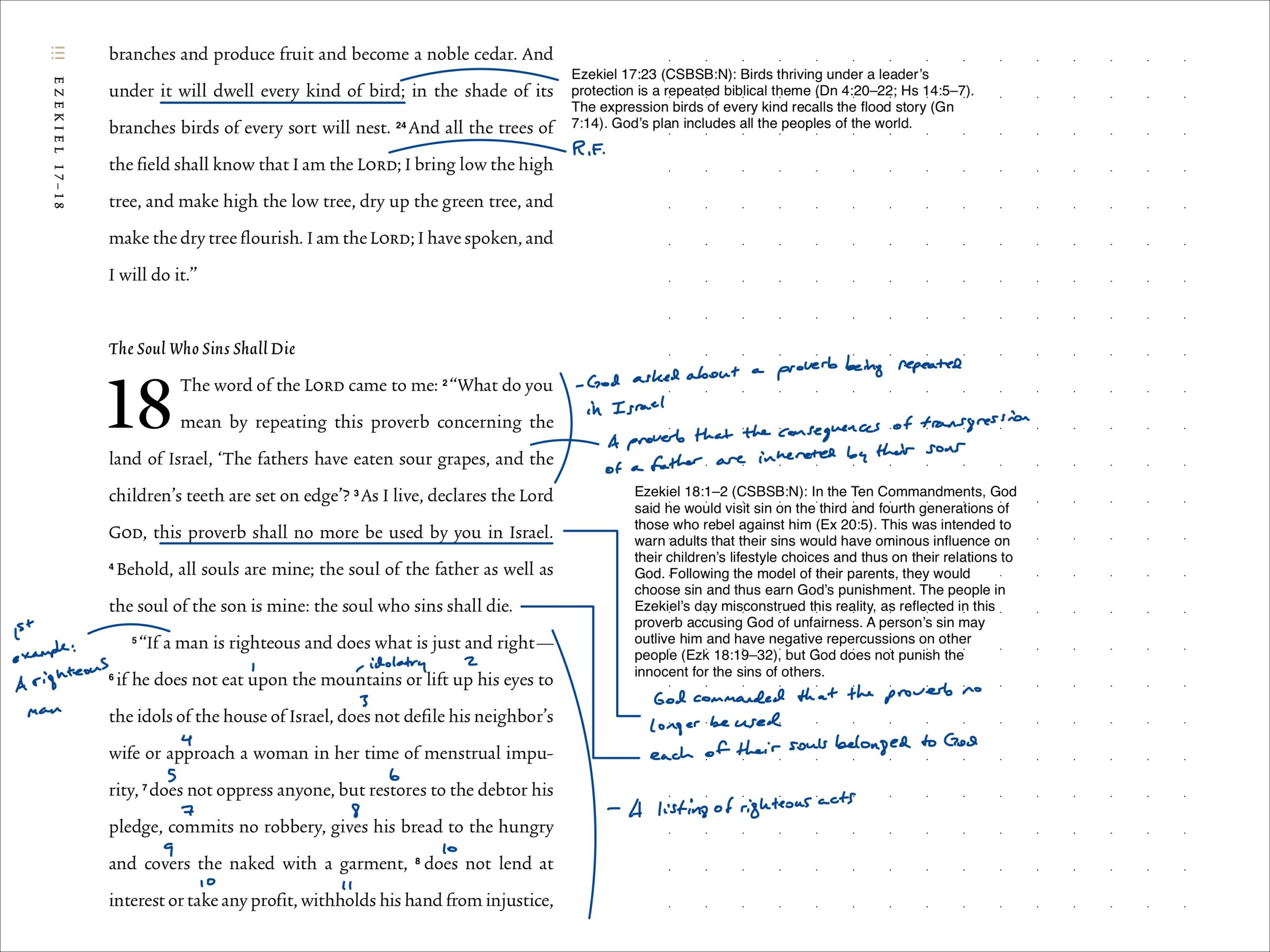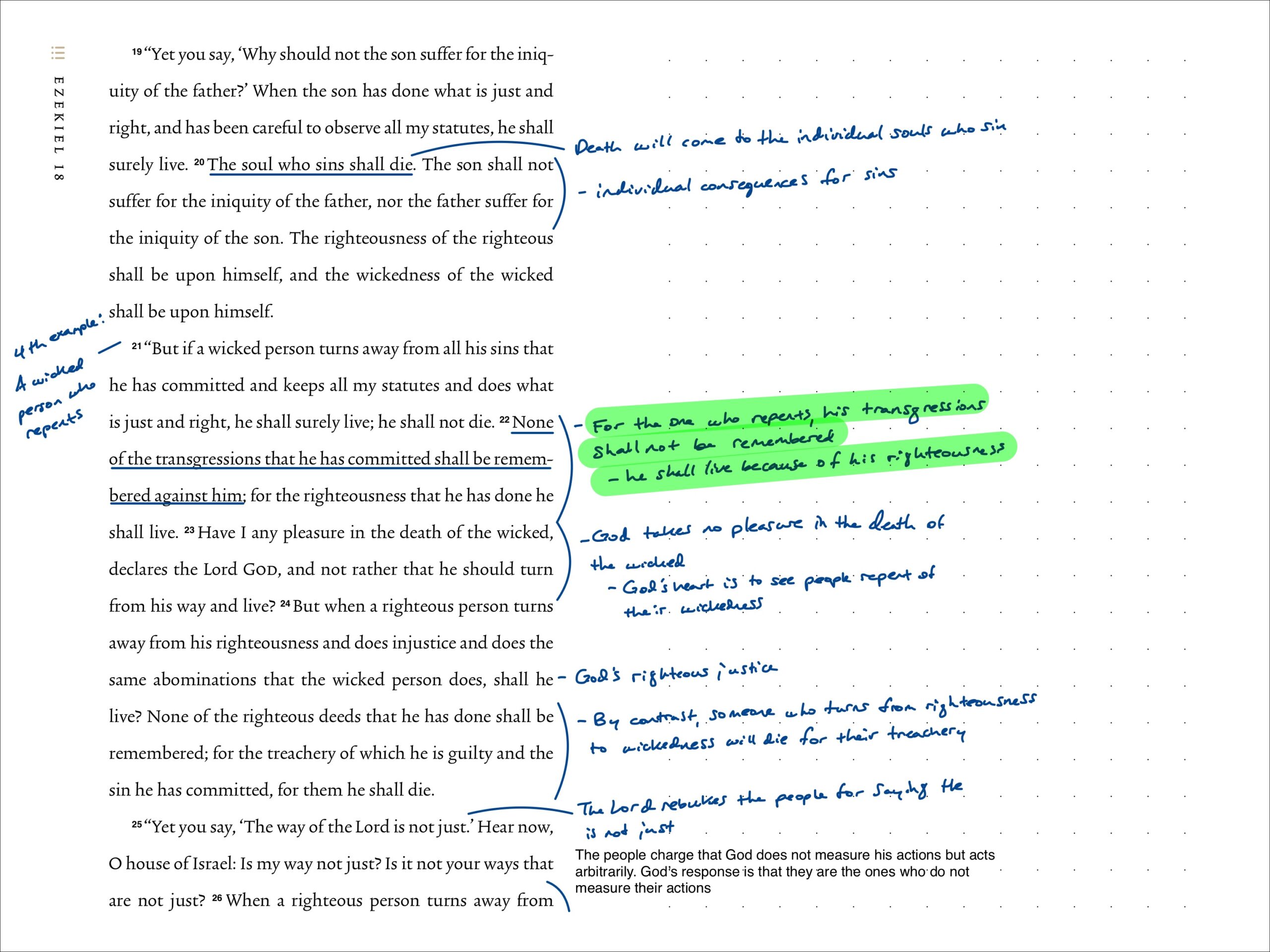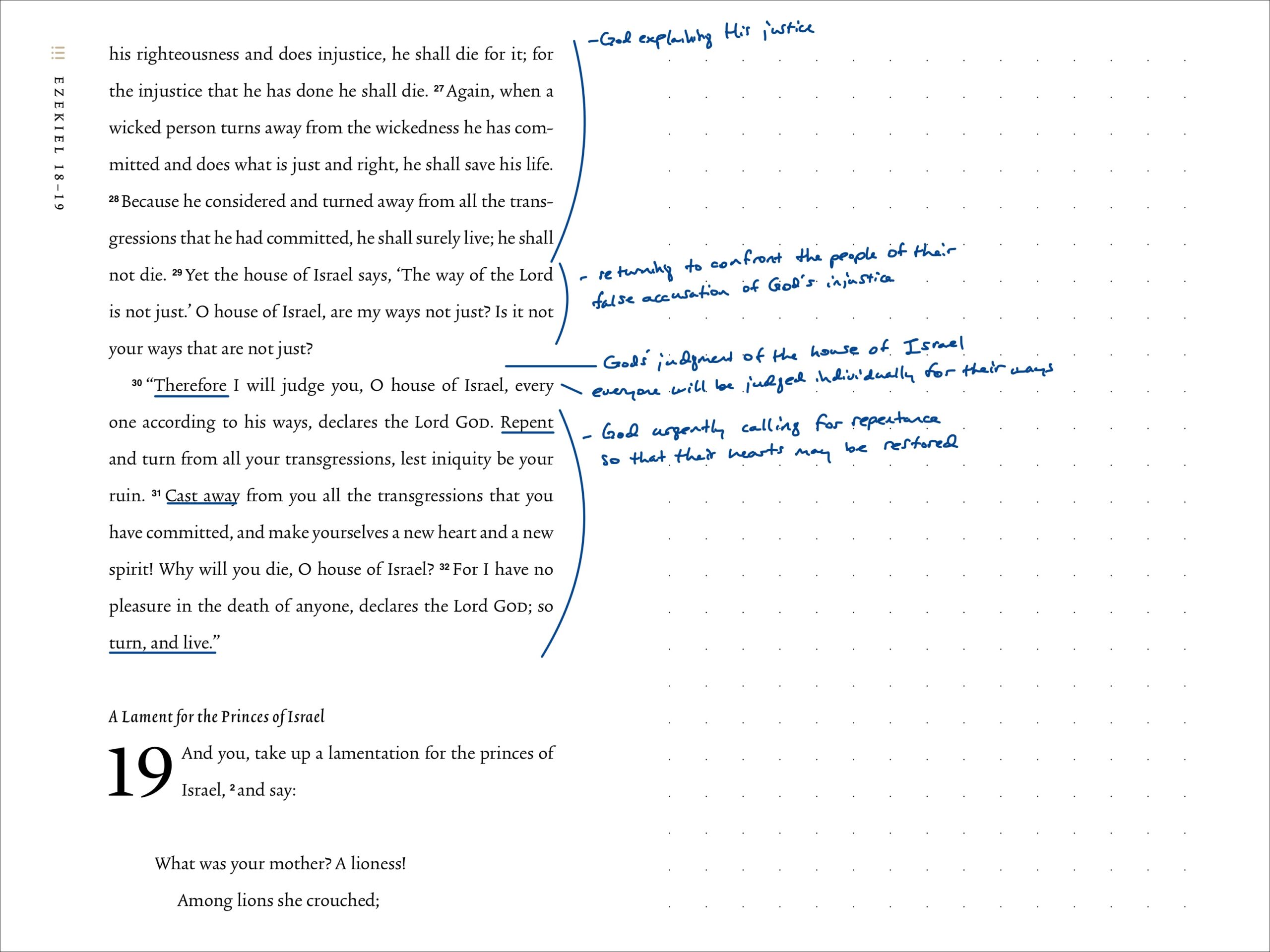| Date | Version | Reading Plan |
|---|---|---|
| @September 8, 2023 | ESV (2016) | ESV Prophets Plan 2023 |
Pericopes
- The Soul Who Sins Shall Die
Notes
The chapter opens with a word that came to Ezekiel from the Lord about a proverb being repeated in Israel about God being unjust; that the consequences of a father would be inherited by the son. In the Ten Commandments, God said that He would visit sin on the third and fourth generations of those who rebel against Him (Exod. 20:5). This was intended to warn adults that their sins would be an ominous influence on their children. The people in Ezekiel’s day had misconstrued this reality, accusing God of injustice. As a result, God commanded that the proverb “shall no more be used by you in Israel” (Ezek. 18:3). A person’s sins may have negative effect on others, but God does not punish the innocent on behalf of the wicked and several sections in the chapter provide examples of this.
The first example in Ezek. 18:5-9 is of a righteous man who “does what is just and right” (Ezek. 18:5). God provides a list of deeds indicative of his righteousness and of his “acting faithfully” (Ezek. 18:9). For this “he shall surely live”.
The second example (Ezek. 18:10-13) is of an unrighteous son from a righteous father. The son shall surely die for all his abominations and “his blood shall be upon himself” (Ezek. 18:13).
The third example (Ezek. 18:14-18) is of a righteous son from an unrighteous father. If he sees his father’s wicked actions and “does not do likewise” (Ezek. 18:14), he will “not die for his father’s iniquity” (Ezek. 18:17) but the father will die for his (Ezek. 18:19)
In Ezek. 19:19-20, God questions the people who say that the son should still suffer for the iniquity of the father despite the son doing what is “just a right” and who is “careful to observe” all of God’s statutes (Ezek. 18:19). God again clarifies that death will come to the individual soul who sins. The righteous shall reap the consequences his righteousness and the wicked for their wickedness.
In Ezek. 18:21-24, God presents the fourth example where a wicked person repents and “turns away from all his sins that he has committed” (Ezek. 18:21). This repentance will lead to all his transgressions being forgotten (Ezek. 18:22). God states through rhetorical question that He takes no pleasure in the death of the wicked but would rather he “turn from his ways and live” (Ezek. 18:24). By contrast, someone who turns from their righteousness and acts wickedly will be remembered only for his wickedness and he shall surely die (Ezek. 18:24).
In Ezek. 18:25-29, God turns the people’s claim of God’s injustice on its head; that it is actually them who is unjust and not Him. God explains how He is perfectly just (Ezek. 18:26-28) and confronts the people of their false accusation against Him (Ezek. 18:29).
The final section (Ezek. 18:30-32) is the judgment to come to the people for their false allegations. God urgently calls for repentance so that they make for themselves “a new heart and a new spirit” (Ezek. 18:31). God’s heart for them is not death but restoration, compelling the people to “turn, and live.” (Ezek. 18:32)
Application
A proverb had been spreading among the people; a misinterpretation of the law in which a son was to inherit his fathers transgression. God saw fit to clarify and provided several examples how the consequences of one’s actions were justly fitted to them individually; administering blessing for the righteous and punishment for the wicked. God expresses His heart that no one should die but instead turn from his ways and live.
A couple of things stood out in today’s reading. First, that God will remember and respond according to one’s final orientation toward Him. Both examples are given in this chapter: God forgetting the wickedness of one who turns to righteousness (Ezek. 18:22) and forgetting the righteous deeds of one who turns to wickedness (Ezek. 18:24). This should be an admonition for us to remain steadfast in our prayers that He continue His work in us to keep our affections for Him properly stirred.
Secondly, this chapter expresses God’s infinitely deep heart and desire for His people to turn away from sin. God is patient, “not wishing that any should perish, but that all should reach repentance.” (2 Pet. 3:9b). The greatest demonstration of love from the Father was in the sending of His Son. In Jesus, the whole fullness of deity dwells bodily, covering our sins in His death and providing for us the focal point of our repentance. It is to Him we are to turn and to Whom our lives are to be aligned in faith.
Scripture Journal Notes
Commentaries & Resources Used
- ESV Study Bible. (Wheaton, IL: Crossway, 2008)
- Faithlife Study Bible (Lexham Press, 2016)
- Believer’s Bible Commentary (Thomas Nelson, 2016)
- CSB Study Bible Notes (Holman Bible Publishers, 2017)
- Matthew Henry’s Commentary on the Whole Bible (Guardian Press, 1976)
- The Bible: A Reader’s Guide (Sterling Publishing, 2011)
- The Infographic Bible (Zondervan, 2018)
- ESV Digital Scripture Journal (Crossway, 2019)



